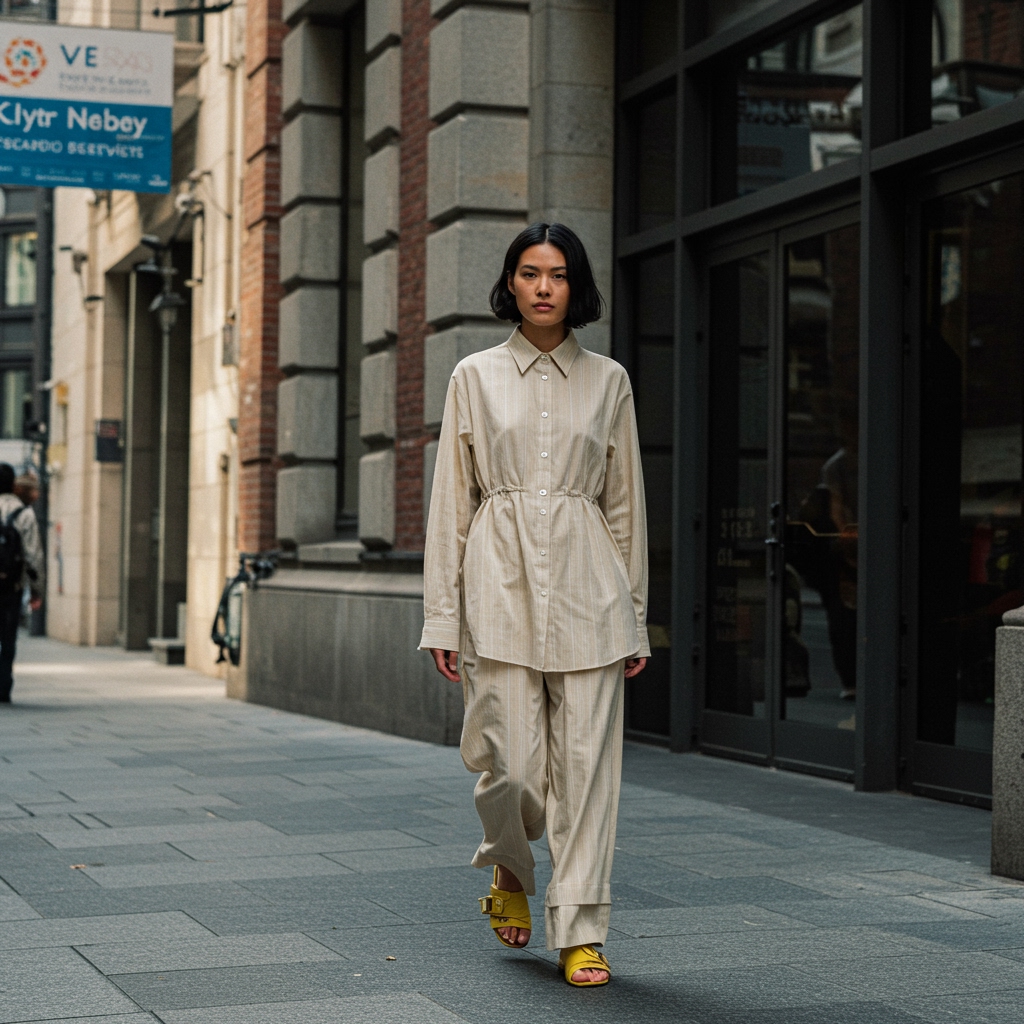Paris, France – January 20, 2025 – At the prestigious Global Fashion Sustainability Summit held today in Paris, luxury fashion powerhouse Aethel Garments announced a landmark initiative set to redefine material sourcing within the high-fashion sector. Titled “FutureThread 2030,” the ambitious program outlines the company’s strategic goal to transition to using 100% certified recycled and renewable materials across its entire product range by the year 2030.
Revealed by Aethel Garments CEO, Isabella Rossi, during a keynote address that captivated industry leaders and environmental advocates alike, FutureThread 2030 represents a profound pivot towards a more circular and responsible production model. This initiative is not merely a incremental step but a transformative undertaking, aiming to fundamentally alter the material composition of Aethel’s luxury collections over the next five years.
The ‘FutureThread 2030’ Vision
The core tenet of Aethel Garments’ FutureThread 2030 is the complete adoption of materials that have demonstrably lower environmental impacts than their conventional counterparts. By pledging to use 100% certified recycled and renewable materials, Aethel is setting a high bar for traceability and environmental integrity. This certification process is crucial, ensuring that materials meet stringent standards for recycled content, sustainable sourcing, and responsible production practices. The goal extends across all categories of Aethel’s offerings, from haute couture and ready-to-wear apparel to accessories and footwear, signifying a holistic transformation of the brand’s supply chain.
This commitment acknowledges the fashion industry’s significant environmental footprint and positions Aethel Garments at the forefront of efforts to mitigate it. Achieving 100% certified materials requires not only sourcing alternatives but also developing the infrastructure and processes necessary to integrate them seamlessly into existing, often complex, luxury manufacturing workflows. The 2030 deadline underscores the urgency and strategic importance Aethel places on this transition, aiming to accelerate progress within the typically more traditional luxury segment.
Eliminating Conventional Materials: A Targeted Approach
A key element of the FutureThread 2030 strategy is the specific targeting and planned elimination of two ubiquitous materials currently prevalent in the global textile industry: virgin polyester and conventional cotton. Virgin polyester, a synthetic fiber derived from fossil fuels, contributes to plastic pollution and relies on non-renewable resources. Its production is energy-intensive and does not readily biodegrade.
Conventional cotton, while a natural fiber, is often associated with significant environmental drawbacks, including intensive water consumption, extensive use of pesticides and fertilizers, and potential soil degradation and biodiversity loss. By phasing out these materials, Aethel Garments aims to drastically reduce its reliance on resource-intensive inputs and lessen its environmental impact related to water usage, chemical pollution, and carbon emissions linked to material production.
Replacing these foundational materials requires innovative solutions. For polyester, the focus will be on certified recycled alternatives, potentially derived from post-consumer waste like plastic bottles or textile scraps. For cotton, the shift will likely involve certified organic cotton, regenerative cotton, or other renewable cellulosic fibers sourced from sustainably managed forests or agricultural byproducts. This deliberate exclusion highlights Aethel’s commitment to addressing some of the most pressing material-related environmental challenges in the fashion sector.
Strategic Partnerships and Significant Investment
To facilitate this ambitious transition, Aethel Garments has established a crucial partnership with EcoSource Global. Known for its expertise in sourcing and certifying sustainable materials, EcoSource Global will serve as a key partner in ensuring Aethel has access to verified recycled and renewable supplies that meet the high standards required for luxury products. This collaboration is vital for building a robust, traceable, and ethical supply chain capable of supporting the 100% certified material goal by 2030.
The initiative is backed by a substantial financial commitment from Aethel Garments. CEO Isabella Rossi announced an investment of $500 million over the next three years dedicated specifically to advancing the FutureThread 2030 objectives. This significant capital injection will be primarily directed towards Research and Development (R&D) and the adoption of new manufacturing technologies. The R&D focus will likely include exploring novel material innovations, developing techniques for processing recycled fibers into high-quality textiles, and enhancing material durability and performance.
Simultaneously, investment in new manufacturing technologies is essential for scaling up the use of these alternative materials. This could involve acquiring advanced machinery for fiber sorting and recycling, implementing water-saving dyeing techniques, or integrating digital technologies for improved supply chain visibility and efficiency. This dual investment in R&D and technology underscores Aethel’s understanding that achieving this goal requires both innovation at the material level and modernization of production processes.
Setting a High-Fashion Precedent
By announcing FutureThread 2030 with such a definitive target and substantial investment, Aethel Garments is deliberately positioning itself as a leader in material innovation within the high-fashion sector. The luxury market, while influential, has sometimes lagged behind other segments in adopting comprehensive sustainability practices, particularly concerning material composition at scale.
Aethel’s commitment sends a strong signal to the industry that sustainability can, and must, be integrated into the core of luxury production without compromising quality, desirability, or craftsmanship. This bold move is expected to inspire other luxury brands to accelerate their own sustainability timelines and explore similar material transition strategies. It aligns Aethel with a growing global consumer base that demands greater transparency and responsibility from the brands they patronize, particularly in the high-end market.
The initiative not only aims to reduce environmental harm but also seeks to create a more resilient and ethical supply chain, mitigating risks associated with resource scarcity and fluctuating raw material markets. Aethel Garments is demonstrating that a future built on recycled and renewable resources is not only environmentally necessary but also strategically advantageous for long-term brand value and relevance in the evolving landscape of luxury.
The Road Ahead
The path to achieving 100% certified recycled and renewable materials by 2030 is undoubtedly challenging, requiring close collaboration across the entire value chain, from material suppliers like EcoSource Global to manufacturers and designers. It necessitates overcoming technical hurdles in material performance and aesthetics to ensure that luxury standards are maintained. However, Aethel Garments executives expressed confidence in their strategic plan and the capabilities of their teams and partners.
The FutureThread 2030 initiative is more than just a corporate goal; it represents a fundamental shift in philosophy for Aethel Garments, embedding environmental responsibility deeply into its brand identity and operational strategy. As the fashion world watches, Aethel’s journey towards this ambitious material target will serve as a crucial case study for how luxury can lead the charge in building a truly sustainable future for textiles.





